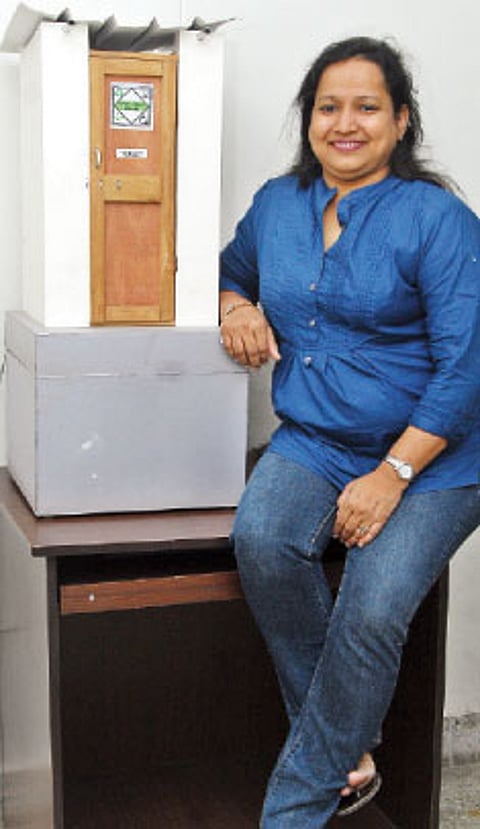

In an era where flushing toilets are the obvious choice, Hyderabad-based entrepreneur Namita Banka, 40, has popularised the composting system which is good for the environment. Her brainchild Banka Bioloo uses bio-digester technology—patented and developed by the Defence Research and Development Organisation—to dispose of human waste in a low-cost and low-maintenance manner.
“We use a set of non-pathogenic bacteria that “eat away” human waste, leaving biogas that can be made into fuel and effluent water that can be reused for gardening,” says Namita, who recently won the prestigious Cartier Women’s Initiative Awards.
She started out as a jewellery designer in Surat in 1999. After her husband was transferred to Hyderabad in 2008, Namita enrolled in a course on social entrepreneurship and tried her hand at selling ink cartridges and green office supplies, tendering to Indian Railways. Through her contacts, she learnt about one of their big problems: sanitation.
In 2009, she joined a course in NGO management, after which she started her own company which initially worked as a service agent for Vibhu Composite Works and Aikon Technologies, original equipment manufactures of controlled discharge toilets. In 2012, Namita bagged a `1.2 crore annual toilet maintenance contract on certain East Coast Railways lines.
Namita believes bio-digester technology is long-lasting and low-cost. She has already supplied 55 bio-tanks to the Integral Coach Factory, a train carriage manufacturer, which fits them under its carriages. Minimum capacity for the tank to function is 450 litres. In addition to its work with railways, Banka Bioloo is installing bio-toilets and 750-litre bio-tanks in public schools and individual households in rural areas of Andhra Pradesh, funded by an NGO.
“Thanks to the government schemes such as Nirmal Gram Panchayats (with an outlay of `4 billion) announced by the Ministry of Rural Development of the Government of India, we seek to address the malaise of open defecation. Railways, too, wish to replace the existing drop chute toilets with bio-toilets (50,000 coaches over the next 10 years),” says the Varanasi-born Namita.
“The bio-toilet can be used as mobile toilets and in resorts, exhibition grounds, remote locations, rural housing, high altitude areas where no communal sewer is available,” says Namita. “They can function at any atmospheric pressure or temperature, from minus 55 to 60 degree Celsius,” she adds.
Modern flush toilets, which use 10 times the average daily drinking water requirement, are unsuited to countries with poor access to water or sewerage networks. “The new system will help keep the platform clean and hygienic. The toilet is also fitted with a controlled flush system to conserve water. This electronically controlled pressurised flushing system uses only 1.5 litre water. I feel this is an innovative approach towards green technology,” argues Namita.
Namita thinks bio-toilets are a viable business given the huge demand-supply gap in this sector. “There is no real competition in this field. Each player has a role to play, and there is no need to eat into each other’s market share. Every company in this sphere has carved a geographic area for itself that it caters to. In southern India, we hold the fort. And over a period of time, have developed a good and strong relationship with the Railways,” she says.
Despite the country’s status as a growing economy, about 350,000 people in India—out of 600,000 villages—still defecate in the open. In about 80 per cent of the rural households, the average water supply is less than 5 hours a day and over 70% of the household do not have access to toilets. “With the current rate of progress, the nation is feared to miss the sanitation target by 32 years,” she adds.
Besides, Banka Bioloo has also undertaken six pilot projects in rural Odisha, where the Central government proposes to equip people with 1000 bio-toilets over a 90 km stretch. About `1,000 crore has been allocated for the bio-toilet project covering 1,000 panchayats across India. The custom-made toilets cost between `15,000 and `18,000 each.
A recipient of numerous awards, Namita is a hardworking humanist. “I never thought toilets would make me famous,” she smiles. “I have only one life, so I have only one mission,” she sums up. “There is a cultural problem across India, where people simply are not used to going inside to use the toilet. My mission is to change this habit,” she says.
Trophy haul
■ Winner of Sankalp 2013 Healthcare, Water & Sanitation Award
■ Cartier Women’s Initiative Awards 2013
■ Changing Markets Award 2013 Finalist